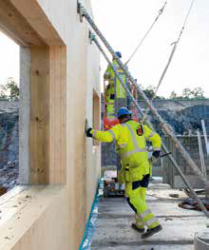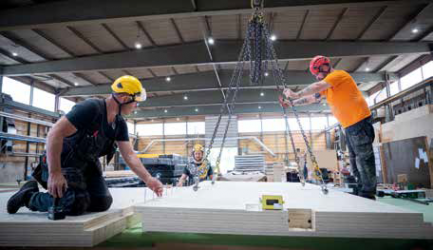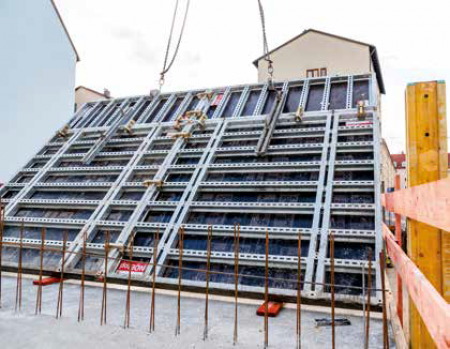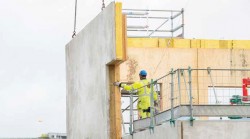Although competing materials on many levels, concrete and timber can combine to provide sustainable hybrid building solutions that will be evidenced by some pioneering developments in Finland.
Finland's leading precast concrete element manufacturer Consolis Parma, housebuilder Arkta Rakennus and Metsä Wood – one of Europe's leading manufacturers of engineered wood products – have launched a research project on hybrid construction that promotes low-carbon construction. The aim is to develop a completely new kind of construction concept mainly for the needs of residential multi-storey construction, which will reduce the environmental impacts of construction by utilising hybrid structures.
The sustainable development of the construction industry focuses on energy and material efficiency, as well as low-carbon construction and the circular economy. "Radically cutting the climate impact is a common concern for the entire construction industry," says Juha Rämö, Technology Director at Consolis Parma. "In line with our strategy, we have put climate issues at the centre of our development work, and our goal is to reduce our emissions by 5% annually and halve them by 2035.
"In terms of the climate impacts of the built environment, the transition from fossil fuels to renewable energy means that the influence of the actual construction phase in the building's lifecycle emissions will increase. As a result, structural solutions and the material choices in construction will play an increasingly crucial role in reducing the climate impact of the construction phase in the future.
"We have launched a whole product family of low-emission concrete products that can significantly reduce material-based emissions from construction. In this research project, we are looking for new ways to reduce even more material emissions by utilising new hybrid structures and the best properties of different materials."


The aim of the partnership between Parma, Arkta and Metsä is to create a material-efficient and low-emission hybrid construction concept. In this context, hybrid construction refers to combining the best features of timber and concrete both in a building frame and façade solutions to make the building low-carbon, energy-saving, long-lasting and cost-effective.
"Hybrid construction enables increasing the share of renewable material in multi-storey construction without compromising building process efficiency or the performance of solution," says Jussi Björman, Director, Business Development Construction at Metsä Wood. "Metsä Wood's lightweight, material efficient and carbon-storing Kerto® LVL engineered wood product is well suited for hybrid construction applications. In co-operation with our partners, we have the best prerequisites for finding the most effective overall solutions."
The structural solutions being developed as part of the research project will be tested in an apartment building project in Finland.
"We are an expert in both concrete and wood construction and we know very well how these two different building materials behave. By utilising this know-how, our goal is to together develop solutions that combine the best properties of wood and concrete with the new hybrid construction system," says Marko Nikander, Technical Director at Arkta Rakennus. "We act as an expert of the construction site and installation process. We want to ensure the development of functional hybrid solutions using the best expertise of the project parties. The end goal of the research project is to produce cost effective and easily replicable low carbon hybrid element structures that create a brand new way of building both in Finland and around the world."
For more information visit: www.metsagroup.com
Images:
01-02. Concrete and timber will combine to provide a long-term hybrid panel product.
03. Kerto LVL are part of the hybrid sandwich timber elements
04. Thanks to their special design and structure, DURAForm formwork panels allow for considerably leaner and resource-saving formwork structures and easy handling on-site
More Concrete & Timber Solutions
Formwork systems give precast concrete its 'form' allowing for quick project delivery. As an aid Metsä Wood has expanded its range of formwork panels with DURAForm. The DURAForm formwork panel line features high stability and reduced deformation, despite its reduced weight. The long-lasting maintenance free birch plywood panels are very easy to work with and provide an especially smooth concrete finish thanks to their special surface.

Produced from high-strength birch plywood, the material offers minimal deflection, even with wide spans. Despite its low weight, DURAForm demonstrates especially high strength. Thanks to the special design and structure, the panels allow for considerably leaner and resource-saving formwork structures and easy handling on-site.
Concrete formwork is heavily stressed during use at construction sites. In this context, the hard scratch-resistant composite surface of the Metsä Wood DURAForm elements makes cleaning and later reuse of the panels easy. The improved crack resistance and reduced chipping, even when fastening using nails, contribute to a consistently high surface quality. Since they can be reused up to 200 times, the DURAForm panels have proven to be particularly resource-friendly beyond their lifecycle in line with the principles of a sustainable circular economy









